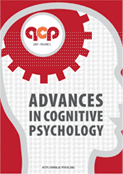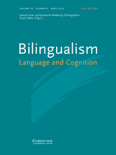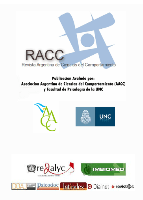
Reti Saperi Linguaggi-Italian Journal of Cognitive Sciences
Scope & Guideline
Fostering Critical Discourse in Cognitive Linguistics
Introduction
Aims and Scopes
- Interdisciplinary Research in Cognitive Sciences:
The journal integrates insights from psychology, linguistics, philosophy, and neuroscience, aiming to provide a comprehensive understanding of cognition and its manifestations in language and behavior. - Embodied Cognition:
A significant focus on how cognitive processes are grounded in bodily experiences, emphasizing the role of the body in shaping perception, language, and social interactions. - Technological Innovations in Cognitive Research:
The journal explores the intersection of technology and cognitive sciences, including the use of virtual reality, AI, and other digital tools to study and enhance cognitive processes. - Cultural and Historical Contexts of Cognition:
An emphasis on how cultural and historical factors influence cognitive processes, particularly in relation to language, emotion, and social behaviors. - Psychopathology and Cognitive Functioning:
Investigating the cognitive aspects of psychological disorders, aiming to bridge the gap between cognitive science and clinical psychology.
Trending and Emerging
- Digital Technologies in Cognition:
There is a growing trend towards exploring the impact of digital technologies, such as virtual reality and AI, on cognitive processes, particularly in rehabilitation and therapy settings. - Embodied and Sensorimotor Approaches:
Recent publications emphasize embodied cognition and sensorimotor interaction as crucial frameworks for understanding cognition, moving beyond traditional cognitive models. - Interpersonal Dynamics in Cognition:
An increasing focus on the relational aspects of cognition, including studies on empathy, social cognition, and the dynamics of caregiver-patient interactions, reflects a shift towards understanding cognition as inherently social. - Neuroscience and Psychopathology Integration:
The integration of neuroscience with cognitive approaches to psychopathology is gaining prominence, particularly in understanding mental disorders through the lens of embodied experience and cognitive function. - Aesthetic Experience and Cognition:
Emerging research is focusing on the aesthetic dimensions of cognition, exploring how creativity, art, and vulnerability influence cognitive processes and emotional experience.
Declining or Waning
- Traditional Linguistic Analysis:
There is a noticeable decrease in papers solely focused on traditional linguistic analysis, as the journal shifts towards more interdisciplinary approaches that incorporate cognitive and technological dimensions. - Philosophical Textual Analysis:
While philosophical inquiries remain relevant, there is a waning interest in purely textual analyses of philosophy, with more emphasis now placed on empirical and cognitive approaches. - Static Models of Cognition:
Previous frameworks that viewed cognition as a static process are being replaced by dynamic and embodied perspectives, indicating a decline in interest in traditional cognitive models that do not account for interaction and context.
Similar Journals

BRITISH JOURNAL OF DEVELOPMENTAL PSYCHOLOGY
Exploring the complexities of developmental psychology.British Journal of Developmental Psychology, published by Wiley, is a leading journal dedicated to advancing the field of psychology with a particular focus on developmental and educational psychology as well as developmental neuroscience. With an ISSN of 0261-510X and E-ISSN 2044-835X, this journal has become an essential platform for researchers and professionals to disseminate their findings, fostering a deeper understanding of developmental processes across the lifespan. As evidenced by its Q2 rankings in both relevant categories for 2023, the journal is recognized for its high-quality content and impactful research. It serves as a vital resource for those studying the complexities of human development, providing insights that inform both academic inquiry and practical applications. Although it does not currently offer open access, the journal maintains a strong commitment to accessibility through various subscription options. Embracing a broad and contemporary scope, the British Journal of Developmental Psychology continues to contribute significantly to scholarly conversations in the field and is poised to shape future research trajectories through 2024 and beyond.

EXPERIMENTAL PSYCHOLOGY
Unveiling the complexities of the mind with rigorous research.EXPERIMENTAL PSYCHOLOGY is a premier journal dedicated to advancing the field of psychology through rigorous empirical research and innovative theoretical insights. Published by HOGREFE PUBLISHING CORP, this esteemed journal features an array of studies that delve into cognitive processes, experimental methodologies, and the intricate workings of human behavior. With a significant impact factor, EXPERIMENTAL PSYCHOLOGY holds a Q1 ranking in Arts and Humanities and maintains a commendable presence in the realms of Experimental and Cognitive Psychology. By providing Open Access options, the journal ensures that vital psychological research is widely accessible, fostering collaboration and knowledge sharing among researchers, practitioners, and students worldwide. Based in the United States, it has been a cornerstone of psychological literature since 1998, continuing to shape the discourse in its diverse and interdisciplinary scope. Researchers seeking to contribute to or stay informed about the latest advancements in psychological science will find EXPERIMENTAL PSYCHOLOGY an invaluable resource.

Advances in Cognitive Psychology
Connecting Researchers to the Heart of CognitionAdvances in Cognitive Psychology is a premier peer-reviewed journal published by UNIV ECONOMICS & HUMAN SCIENCES WARSAW, dedicated to the exploration of psychological processes underlying cognition. With its open access model implemented since 2005, the journal facilitates wide-ranging dissemination of cutting-edge research across various branches of psychology, including applied, clinical, experimental, and cognitive psychology. Despite its modest standing in terms of impact factor, reflected in its Q3 and Q4 rankings across numerous subfields, it remains an important platform for emerging researchers and seasoned professionals alike, aiming to foster insight into complex mental processes and enhance understanding of behavioral patterns. The journal's commitment to accessibility empowers a diverse community of readers, including students, to engage with innovative studies and reviews, contributing to the collective knowledge within the psychological sciences. Located in Poland, Advances in Cognitive Psychology is open for submissions from worldwide researchers, encouraging a global perspective on cognition and behavior.

Bilingualism-Language and Cognition
Transforming Understanding of Language and ThoughtBilingualism-Language and Cognition, published by Cambridge University Press, is a leading journal in the fields of Education and Linguistics, renowned for its rigorous academic contributions and influential research. With an impressive impact factor placing it in the Q1 quartile of both fields, this journal ranks among the top-tier publications globally, reflecting its commitment to advancing the understanding of bilingualism and its cognitive implications. Since its inception in 2005, Bilingualism-Language and Cognition has garnered significant attention, evidenced by its remarkable Scopus rankings—11th in Language and Linguistics and 12th in Social Sciences. Dedicated to publishing high-quality original research, reviews, and integrative studies, the journal aims to foster interdisciplinary dialogue among researchers, educators, and practitioners. Although not currently an open access journal, it remains a vital resource for those engaged in bilingualism research and its cognitive dimensions, contributing to the academic landscape from its home in Cambridge, United Kingdom.

Revista Argentina de Ciencias del Comportamiento
Advancing Behavioral Insights Across BordersRevista Argentina de Ciencias del Comportamiento, published by the UNIV NACL CORDOBA, FAC PSICOLOGIA, is a prominent open-access journal based in Argentina, dedicated to exploring diverse aspects of behavioral sciences since its inception in 2009. With an ISSN of 1852-4206, this journal has become an essential platform for disseminating innovative research, particularly in the realms of Behavioral Neuroscience, Developmental and Educational Psychology, Experimental and Cognitive Psychology, and Linguistics and Language. Although currently positioned in the Q4 and Q3 quartiles across several categories as of 2023, the journal is steadily building its reputation within the academic community, as reflected by its Scopus rankings and growing accessibility to researchers and practitioners. The Revista Argentina seeks to promote interdisciplinary dialogue and collaboration among scholars in the behavioral sciences, offering valuable insights for both theory and practice. It serves as a critical resource for those engaged in psychology and related fields, supporting the continuous exchange of knowledge vital for advancing research and education.

Language Cognition and Neuroscience
Fostering Interdisciplinary Dialogue in Language and NeuroscienceLanguage Cognition and Neuroscience is a premier peer-reviewed journal published by ROUTLEDGE JOURNALS, TAYLOR & FRANCIS LTD, focusing on the intersection of linguistics, cognitive psychology, and neuroscience. Since its inception in 2013, this journal has established itself as a vital resource for researchers and scholars, contributing significantly to the understanding of how language is processed and represented in the brain. With its impressive rankings in various categories—Q1 in Linguistics and Language, Q2 in Cognitive Neuroscience, and Experimental and Cognitive Psychology—it caters to a diverse and interdisciplinary audience. The journal is accessible to readers worldwide, effectively communicating cutting-edge research and innovative methodologies in the field. Open Access options enable broader disseminations of knowledge, ensuring that significant findings reach both academic and practical applications. With a commitment to high-quality research, Language Cognition and Neuroscience continues to be an influential platform for advancing theories and practices within cognitive science and language studies.

COGNITION & EMOTION
Pioneering Research at the Intersection of Thought and EmotionCOGNITION & EMOTION is a leading academic journal published by Routledge Journals, Taylor & Francis Ltd, focusing on the dynamic interactions between cognitive processes and emotional responses. Established in 1987, this esteemed journal has made significant contributions to the fields of Arts and Humanities, Developmental and Educational Psychology, and Experimental and Cognitive Psychology, consistently ranking in the top quartile (Q1) across various categories. Housed in the United Kingdom, COGNITION & EMOTION boasts a remarkable impact factor, underscoring its influence and importance in advancing psychological research and theory. While this journal does not offer open access, it remains a vital resource for scholars, professionals, and students seeking to deepen their understanding of emotional and cognitive phenomena. With a commitment to rigorous peer-reviewed research and innovative insights, COGNITION & EMOTION is essential for anyone aiming to stay at the forefront of psychological studies.

BRAIN AND LANGUAGE
Advancing Understanding in Cognitive Neuroscience and LinguisticsBRAIN AND LANGUAGE is a premier journal published by Academic Press Inc Elsevier Science, dedicated to fostering scholarly communication in the fields of Cognitive Neuroscience, Linguistics, Psychology, and Speech and Hearing. With its ISSN 0093-934X (Print) and 1090-2155 (Online), the journal has established a significant presence since its inception in 1974, continuing to provide valuable insights into the intricate relationship between brain function and language processing. This journal is highly regarded, boasting a 2023 ranking of Q1 in Linguistics and Language, reflecting its influential contributions to the field, alongside Q2 rankings in categories such as Cognitive Neuroscience and Experimental Psychology. With a rigorous peer-review process, it serves as an essential resource for researchers and professionals seeking to deepen their understanding of language mechanisms and their cognitive underpinnings. Despite not being an Open Access journal, BRAIN AND LANGUAGE ensures that its articles are widely accessible and of high quality, making it an indispensable platform for both emerging and established scholars aiming to expand the boundaries of research in language and cognition.

Journal of Cultural Cognitive Science
Innovating Research at the Culture-Cognition NexusThe Journal of Cultural Cognitive Science, published by SpringerNature, is an esteemed forum for researchers and scholars dedicated to exploring the intersection of culture, cognition, and language. With its ISSN 2520-100X and E-ISSN 2520-1018, this journal has made significant strides since its inception in 2017, covering a wide array of topics pertinent to Experimental and Cognitive Psychology and Linguistics and Language. Notably, it has achieved remarkable recognition, ranking in the Q3 category for Experimental and Cognitive Psychology and Q1 for Linguistics and Language in 2023. Its Scopus ranks further illustrate its impact, with the journal positioned at the 89th percentile in Social Sciences - Linguistics and Language and 47th percentile in Psychology. Despite its ongoing journey, it continues to foster open dialogue and innovation among professionals, researchers, and students, providing valuable insights and advancing knowledge in the field.

Journal of Cognitive Science
Pioneering Research in Cognitive ProcessesThe Journal of Cognitive Science, with ISSN 1598-2327, is a distinguished publication from SEOUL NATL UNIV, INST COGNITIVE SCIENCE, focusing on the multidisciplinary field of cognitive science. Established in 2016, this journal aims to advance knowledge in various domains, including Artificial Intelligence, Cognitive Neuroscience, and Experimental Psychology, while also delving into Linguistics and Language. Although currently categorized in Q4 for several subjects in the 2023 rankings, it presents an invaluable platform for innovative research and scholarly discourse, providing insights that connect cognitive processes with practical applications, thus fostering cross-disciplinary collaboration. Located in South Korea, the journal adheres to rigorous academic standards, inviting submissions that contribute significantly to understanding cognition in a digital age. While it does not offer Open Access, readers can access articles through university libraries and academic databases, engaging with the latest findings and theories that shape the future of cognitive science.